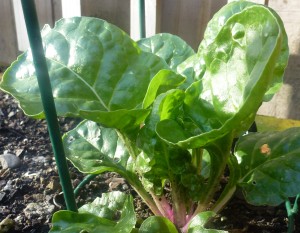By Stuart Mason – Chemistry Teacher, High School
It was in the latter part of 2016 when two girls from a class in the primary school knocked on the door of the Tawari laboratory, full of senior chemistry students. I was handed two folded paper envelopes that had been labelled ‘coriander’ and ‘silver beet’ in neat pencilled italics. Yes, they were seeds and yes they were for me and no I didn’t owe them any money and goodbye, because they were off to continue their mission sharing seeds.
As negligence is my main gardening technique, I was never going to be up to the task of honouring the generosity of the giving, so the seeds were passed to the one with the green fingers in our household. This picture shows Sonya’s success.
 The fact that I can only acknowledge the girls anonymously highlights for me, a challenge that can arise within our school despite community-wide events such as Matariki celebrations and Peace Day, as we spend so much time working within our own prepared environments, suited to the relevant plane of development.
The fact that I can only acknowledge the girls anonymously highlights for me, a challenge that can arise within our school despite community-wide events such as Matariki celebrations and Peace Day, as we spend so much time working within our own prepared environments, suited to the relevant plane of development.
The teachers in the High School particularly get asked questions about what goes on in Tawari, the 15-18 class. Do they do NCEA? How is it different from the other classes? Yes, students do NCEA courses at Levels 1, 2 and 3 and in general they have been very successful.
The High School is a ‘School of experience in elements of social life’ (meaning the adult world). There aren’t the same kind of materials on shelves, but the adults in the classroom are a part of the prepared environment and the students’ work is to test their adulthood. By the second half of the Third Plane, the students in the 15-18 programme are moving away from the earlier investigation of identity and personal place within a community into an exploration of the roles they will play more specifically as they move out into further education and work.
The timetable gives students choices of NCEA subject classes and options for how to best use independent work time. They meet together, alongside the teachers, to make decisions about how the community will run. There is community work, seminar discussion and reflection time. As in earlier years, the students take care of a ‘house’, and this experience is reflected well in a quote of an American Montessori High School graduate on her first university flatting experience with other, non-Montessori students: “Mom, these people don’t know how to live!”. The Tawari class is still growing and is expected to reach a roll of 60 students within the next three years.
I gather the next step in the seed-sharing business is that I will harvest seeds from the silver beet plant and pass them on. I will have to talk with Sonya about that.